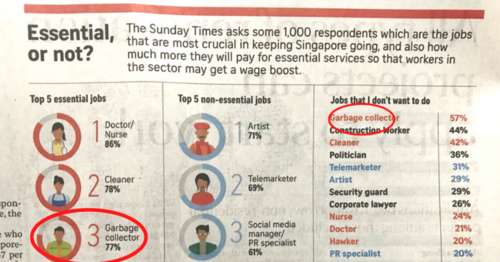Recently, a study by the Milieu firm has sparked some debate amongst Singaporeans. The results, published in the Sunday Times has drawn some criticism from Singaporean employees all around the country. As a manpower outsourcing agency in Singapore, we believe that both job seekers and employers have the power to turn any role - essential or non-essential, into one that adds value to their respective organisations.
Essential vs Non-Essential Jobs

Here’s a quick recap for the uninitiated. Based on the study by Milieu, jobs such as ‘Artist’ and ‘Social Media Consultant’ have been ranked as some of the top non-essential jobs during the Covid-19 season. The published results of the research are as follows:
Jobs deemed essential during the Covid-19 season:
Doctor/Nurse
Cleaner
Garbage Collector
Hawker
Delivery Person (food and otherwise)
Jobs deemed not essential during the Covid-19 season:
Artist
Telemarketer
Social Media Manager/PR Specialist
Business Consultant
Human Resource Manager
But there is more to the results than meets the eye. As an HR outsourcing agency, we would like to highlight ‘non-essential’ work in a more positive perspective - that professions deemed “non-essential” are in fact professions that can continue to be done digitally from the safety of home. It signifies that companies for such positions have successfully made crucial shifts to digital, and can ensure that their Business Continuity Plans (BCP) is able to run smoothly from home.
Companies who are not able to make a smooth transition into digital processes may find themselves rushing all their employees back to the office, the moment circuit breaker lightens up enough for that to happen.
Non-Essential Employees are Digitally Skilled Employees
Non-essential employees are digitally skilled employees. Digitally skilled employees are the ones who can continue their work remotely from home.
Employers these days are always on the lookout for employees with strong digital skills. However, research shows that 70% of employees want to work for digitally mature companies. So this begs the question of whether your company is digitally mature enough for new employees.
Here are the key characteristics of digitally mature organisations:
Clear Vision: Does your organisation have a clear digital vision? More importantly, is this vision concrete, and has it been communicated to your employees?
Strong Digital Leader: A clear digital vision is important but is your leader familiar with the ever-changing digital landscape? In fact, more than 50% of companies with high growth rates agree that they owe their success to a strong digital leader.
Valuable Analytics: Does your company have the actionable data and insights needed to make tangible changes? It’s one thing to invest time and money into big data analytics. But organisations will need to find out what their customers want and what their employees need in order to adopt the proper digital tools needed.
Digital Interaction: Organisations that choose to interact with both their employees and customers digitally are ahead in the digital transformation game. Choosing to focus on digital interaction will also make your organization’s business processes much more efficient.
Cybersecurity: Cybersecurity is essential to all organisations. Especially when you have employees working remotely or using their personal devices. In fact, during the early work-from-home days, there were a number of COVID-19 related cyber scams that some might have fallen victim to (read here).
Streamlined Recruitment Process: Having proper recruitment and onboarding process leads to a faster hiring process. This results in happier candidates and employees as well as a polished employee brand. One way to streamline your recruitment process is by outsourcing it to a third party agency.
Learn more about recruitment process outsourcing (RPO) here.
Additionally, being digitally mature has shown to be very effective for a number of organisations. We’ve experienced first hand just how important digital transformation is, especially during the current COVID-19 pandemic, where digital transformation equals survival.
Have you tried Training to Retain Good Employees?

One of the first steps to proper digital workplace transformation is to upskill your current employees and give them the proper tools needed to do their job well. Imparting digital skill knowledge to your employees is not only beneficial when it comes to attracting new talents. It helps your organisation retain current employees — especially during a time when employees are worried that they’ll lose their jobs to artificial intelligence or automation.
Additionally, there are many benefits to digitally training employees. Some of the top benefits include:
Increased efficiency: Companies that choose to invest in proper digital tools and training will benefit from having efficient and productive employees.
Better employee experience: Investing in your employees makes them feel more valued. It results in happier employees.
Makes your organisation a stronger competitor: Faster communication with your customers and/or clients, along with better service turnover gives your organisation the competitive edge it needs.
Below are some of the most essential digital skills HR teams and executives must start training their employees to have:
Digital Communication: The ability to use various web applications (i.e. Google Hangouts, Slack, Telegram) to communicate with both colleagues and customers safely.
Digital Collaboration: Learning the safe way to upload sensitive documents online for collaborative purposes (e.g. editing). Most organisations use cloud-based applications such as Dropbox and Google Docs for collaborative purposes.
For a more comprehensive list of collaborative HR tools and apps click here.
Cybersecurity: Basic cybersecurity knowledge is perhaps one of the most important skills that HRs should be training all employees with. Skills such as recognising phishing threats, identifying unsecured websites, as well as password protection habits contribute to the security of your organization’s network.
For a full list of basic cybersecurity knowledge, browse through some of BGC Group articles below:
10 Things Employees in Singapore Should NOT Do Using the Work Computer
Cybersecurity Threats Your Introverted Employees Tend To Attract Based On Their MBTI!
Telecommuting: A Last-Minute Checklist for HR and Employers in Singapore
Alternatively, visit A Very Normal Company’s blog for more HR related cybersecurity content
Programming: As more and more companies are going digital, the need for programming skills has increased. Programming is a multifaceted skill. Employees who learn to program can also benefit from a range of soft skills (e.g. problem-solving and logic skills).
Learn more about why programming is important to Singaporean employees here.
Whether or not your job is deemed an essential position depends on the success of the digital transformation of your company and industry.
In addition, the skills we've listed above are some of the basic ones that are great to start off with. Keep in mind that different organizations will require different skills to aid them during the digital transformation.
What other digital skills do you think HR executives and employers should share with their employees? Let us know in the comments section below!
